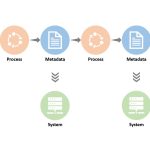Data lineage isn't new, but automation has finally made it accessible and scalable-to a certain extent. In the old days (way back in the mid-2010s), lineage happened through a lot of manual work. This involved identifying data assets, tracking them to their ingestion sources, documenting those sources, mapping the path of data as it moved through various pipelines and stages of … [Read more...] about Data Lineage is Broken – Here Are 5 Solutions To Fix It
Big Data
Learn everything you need to know about big data. Find out how companies are using this revolutionary technology and what it means for your business strategy.
Why Business Data Processing Function is Vital for Organizations?
Statista projects global data creation to be more than 180 zettabytes by 2025. Besides, the total amount of data created, captured, copied, and consumed worldwide reached 64.2 zettabytes in 2020 and is forecasted to increase rapidly.Whether you use the internet to order food, complete financial transactions online or learn about a certain topic, data is produced every single … [Read more...] about Why Business Data Processing Function is Vital for Organizations?
How Power BI Dashboards Help Organizations Optimize Efficiency
In the digital world, Data Visualization plays a key role in Data Analysis since it enables all types of industries to examine data across numerous sources and gather trends, patterns, and outliers from them. But, performing Data Visualization with traditional systems or tools is highly difficult, and prone to errors. Hence, a BI tool along with innovative Data Visualization … [Read more...] about How Power BI Dashboards Help Organizations Optimize Efficiency
Data Governance Best Practices – Where to Start
Long recognized as a must in the data-driven world, data governance has never been easy for big and tiny organizations alike. Today, the complexities associated with adopting data governance best practices are greater than ever. Data, both structured and unstructured, is arriving in increasing volumes from proliferating sources to be stored and processed on multiple platforms. … [Read more...] about Data Governance Best Practices – Where to Start
5 Ways Deep Tech and Big Data are Transforming Our Way of Life
In this tech-driven day and age, we rely on continuous technological advancement to elevate our quality of life in the public sector, take industries forward in the private sector, and push towards new governmental incentives that will benefit humanity as a whole. Together, all of these sectors are driven by the need for more sophisticated tech solutions, bringing innovation to … [Read more...] about 5 Ways Deep Tech and Big Data are Transforming Our Way of Life
What is big data?
Big data is a term that refers to the massive amount of digital data created and shared every day. Big data can transform how we live, work, and communicate. It can be used to improve everything from public health and urban planning to business and marketing.
Big data is also changing the way we think about privacy and security. The volume, velocity, and variety of big data present challenges and opportunities for organizations and individuals. Regardless, big data is here to stay, and its impact will only continue to grow in the years to come.
What is big data analytics?
Big data analytics is the process of turning large, complex data sets into actionable insights. Businesses use various analytical tools and techniques, including machine learning and statistical analysis, to do this.
Big data analytics can be used to improve decision-making in areas like marketing, operations, and customer service. It can also be used to identify new business opportunities and optimize existing processes. With the help of big data analysis, businesses can gain a competitive edge by using their data better.
Want to learn more about big data? Datafloq has courses available. Contact us to get started.
When was big data introduced?
The term big data was coined in the 1990s, with some giving credit to John Mashey for popularizing the term. However, the concept of big data has been around for much longer.
Where does big data come from?
In the early days of computing, scientists and businesses began to realize that the amount of data being generated was increasing exponentially. As a result, they began to develop new methods for storing and processing data.
Over time, these methods have become increasingly sophisticated and have played a key role in enabling businesses to make sense of vast amounts of information. Today, big data is used in various industries, from retail to healthcare, and its importance is only likely to grow in the years to come.
What are examples of big data?
One of the most common examples of big data is social media data. With over 2 billion active users, Facebook generates a huge amount of data every day. This includes information on user interactions, posts, and even location data. Analyzing this data can help companies better understand their customers and target their marketing efforts.
Another example of big data is GPS signals. These signals are constantly being generated by devices like cell phones and fitness trackers. When combined with other data sets, GPS signals can be used to provide insights into everything from traffic patterns to human behavior. Finally, weather patterns are another type of big data set. By tracking these patterns over time, scientists can better understand the impact of climate change and develop strategies for mitigating its effects.
How do companies use big data?
Companies use big data in marketing, product development, and customer service. By analyzing large data sets, businesses can identify patterns and trends that would be otherwise difficult to spot. For example, a company might use big data to track customer behavior patterns to improve its marketing efforts.
Alternatively, a company might use big data to improve its products by identifying areas where customers are most likely to experience problems. For instance, big data can be used to improve customer service by finding pain points in the customer journey. Ultimately, big data provides companies with a valuable tool for gaining insights into their business operations.







